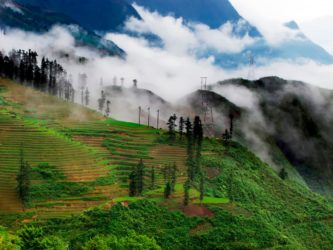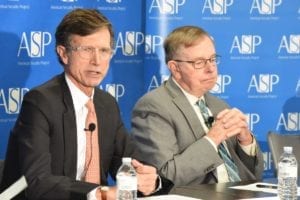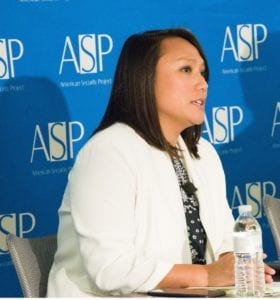
Event Recap: Climate and Security in Southeast Asia
Podcast: Play in new window | Download
Subscribe: Apple Podcasts | RSS
[embedyt] https://www.youtube.com/watch?v=MPbXRHIQKkE[/embedyt]
On October 3, the American Security Project hosted a public event on climate and security in Southeast Asia. Distinguished guests Vice Admiral Lee Gunn, USN (Ret.), Ambassador Robert O. Blake, Jr., and Ashley Westerman joined us for a panel discussion on how climate change is affecting security in the region. ASP Climate Security Program Manager Esther Babson moderated the discussion.
 Vice Admiral Gunn identified three stresses on nations in Southeast Asia. First, the population in the region is expecting to continue growing. This is a stress on resources. Scarcer resources, as a result of climate change, means more competition and potentially a security issue. Second, the increasing population has rising expectations. The region has rebounded from the Asian financial crisis and people want economic growth to continue. Much of this growth has been fueled by fossil fuels, which was Admiral Gunn’s third stressor. As economies in Southeast Asia have grown, so too have their energy demands. This creates a dilemma: countries who are very vulnerable to rising sea levels and other effects of climate change, are also contributing to the emissions that are causing rising temperatures and sea levels.
Vice Admiral Gunn identified three stresses on nations in Southeast Asia. First, the population in the region is expecting to continue growing. This is a stress on resources. Scarcer resources, as a result of climate change, means more competition and potentially a security issue. Second, the increasing population has rising expectations. The region has rebounded from the Asian financial crisis and people want economic growth to continue. Much of this growth has been fueled by fossil fuels, which was Admiral Gunn’s third stressor. As economies in Southeast Asia have grown, so too have their energy demands. This creates a dilemma: countries who are very vulnerable to rising sea levels and other effects of climate change, are also contributing to the emissions that are causing rising temperatures and sea levels.
Admiral Gunn also noted the flow of rivers stemming from the Himalayas, to include the Mekong, Yangtze, and Yellow rivers, is another area of regional security significance. These rivers are critical to the communities downstream. As of late, these rivers have experienced dramatically different flows, partially due to snow melt, but also damming by countries up river.
Ambassador Blake opened his remarks with a vignette from his time as U.S. Ambassador to Indonesia. He said that the U.S. Pacific Combatant Command Commander would regularly visit Indonesia, and when he did, he would make time to answer questions from the local press. One time the press asked him what he believed was the largest threat in the region. He answered, climate change.
Indonesia is vulnerable to the threats of climate change, but it is also the world’s fifth largest emitter. The country has made progress growing its economy. Much of that growth, however, has been fueled by carbon. Specifically, 50 percent of its growth in carbon emissions has been a result of deforestation and coal, which is affecting human health and contributing to sea level rise.
Ambassador Blake did, however, highlight positive steps Indonesia is taking to combat climate change. At the Paris conference on climate change, the country committed to a 29 percent reduction in emissions by 2030 and a 23 percent increase in renewables by 2025.
There are several structural impediments to Indonesia meeting their targets, Ambassador Blake argued. One, it is a huge country. Two, law enforcement is not up to par and corruption is a problem. Three, the government has not enforced current laws penalizing those that set fires for agriculture cultivation. In closing, Ambassador Blake noted that Indonesia will not make their targets, but they are trying.
 Ashley Westerman explained that Southeast Asia is in a quandary. The countries in the region need to develop, but those developments are not climate friendly. There is a reliance on coal, which China gladly exports as it tries to green its economy at home. In fact, Westerman noted that the IMF reported that carbon emissions in Southeast Asia were higher than anywhere else in the world from 1990 to 2010. She argued that the connection between climate change and security is a strong one. If sea levels rise and destroy agricultural land and livelihoods, people will need to find new land and a new job. Armed terrorist groups make tactical decisions based on food security. Finally, extreme weather events cause people to move. Many will move to cities, adding additional pressures and potentially clashing with established populations. In summary, Westerman offered that conflict in the region can be traced back to pressures on people caused by climate change. If the world wants to mitigate the security risk, something must be done about climate change.
Ashley Westerman explained that Southeast Asia is in a quandary. The countries in the region need to develop, but those developments are not climate friendly. There is a reliance on coal, which China gladly exports as it tries to green its economy at home. In fact, Westerman noted that the IMF reported that carbon emissions in Southeast Asia were higher than anywhere else in the world from 1990 to 2010. She argued that the connection between climate change and security is a strong one. If sea levels rise and destroy agricultural land and livelihoods, people will need to find new land and a new job. Armed terrorist groups make tactical decisions based on food security. Finally, extreme weather events cause people to move. Many will move to cities, adding additional pressures and potentially clashing with established populations. In summary, Westerman offered that conflict in the region can be traced back to pressures on people caused by climate change. If the world wants to mitigate the security risk, something must be done about climate change.
Ending on a positive note, Esther Babson asked the panelist if they see any positive developments on combating the threats of climate change. Admiral Gunn said that the human ingenuity being applied to solve the problems of today is remarkable and brings him hope. Ambassador Blake agreed and added that the role of the private sector in driving innovation is also key; Amazon has pledged to have net zero emissions by 2040. Finally, Westerman echoed Admiral Gunn’s and Ambassador Blake’s optimism about innovation. She added that Bangladesh recently gave all its rivers the same rights as humans to protect them against polluters and environmental degradation. While the law has not yet been tested, she posited that it is an interesting case for how governments may handle climate change.





